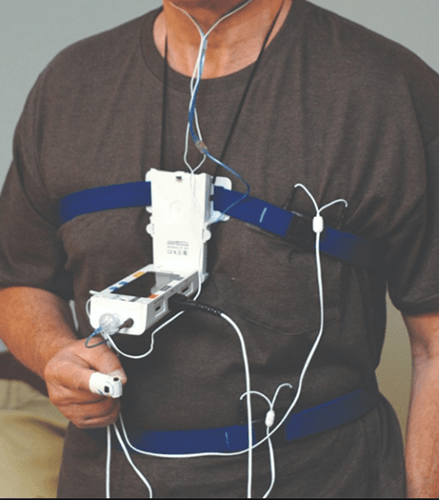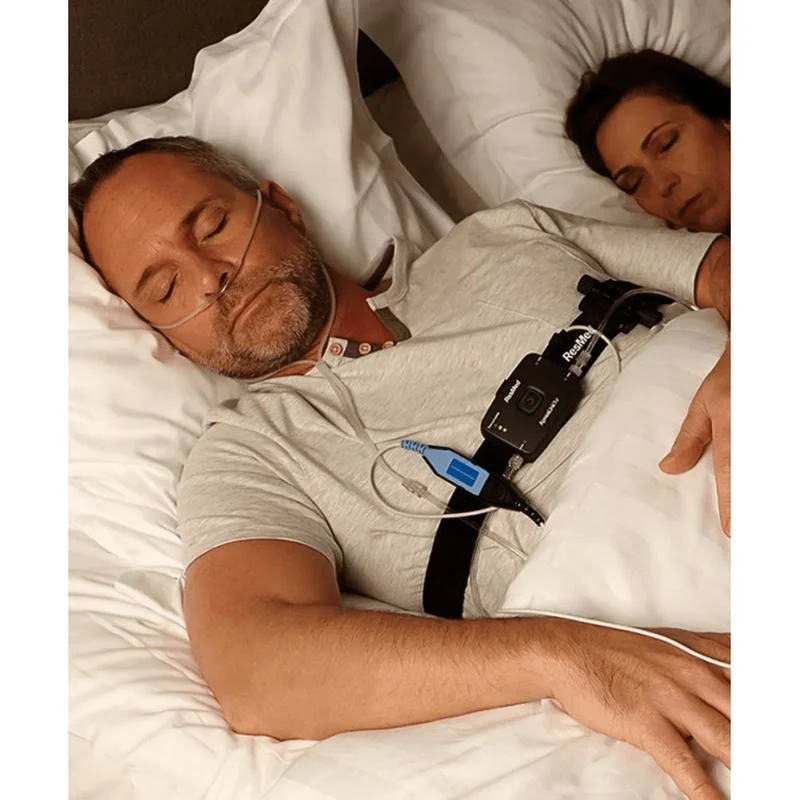Polysomnography, known as a sleep study, is a test used to diagnose sleep disorders. Polysomnography records your brain waves, the oxygen level in your blood, and your heart rate and breathing during sleep. It also measures eye and leg movements.
A sleep study may be done at a sleep disorders unit within a hospital/home or at a sleep center. The test is usually performed at night. But it may be done during the day for shift workers who usually sleep in the daytime.
In addition to diagnosis, a sleep study might help determine a treatment plan if you’ve been diagnosed with a sleep disorder. It also might be used to adjust your treatment.
Sometimes you may be able to do the sleep study at home. Home sleep apnea tests are used to help diagnose obstructive sleep apnea.
If you’re doing a sleep study from home, there are different types of devices that may be used. Each device uses a different combination of sensors. Home sleep apnea tests generally record your breathing rate and airflow, as well as oxygen levels and heart rate. One style also includes information on blood vessels.
Sleep studies can take place in a sleep clinic or laboratory, and the patient typically spends a night in a specially designed room with monitoring equipment attached to their body. In some cases, portable home sleep studies can be conducted for more straightforward diagnoses like sleep apnea. It involves monitoring and recording several physiological parameters while an individual sleeps.
A sleep study is a diagnostic test, meaning that healthcare providers use it to diagnose or rule out health issues. Healthcare providers usually recommend this test when you have symptoms of conditions that affect sleep, to determine how to treat those conditions or to see if completed treatments worked. These are generally conditions that affect or disrupt your brain, nervous system, breathing and heart function.
Conditions that a sleep study can diagnose include:
Sleep apnea (obstructive and central).
Narcolepsy.
Periodic limb movement disorder (including restless legs syndrome).
Insomnia.
Certain types of seizures and epilepsy.
Night terrors (also known as sleep terrors).
Nocturnal panic attacks.
Sleepwalking or other sleep behavior-related disorders.
Sleep paralysis.
Other types of parasomnias and disruptive sleep disorders.
There are several types of sleep studies, each serving a specific purpose. Here are some common types of sleep studies
Level 1 sleep study is the same as a level 2, except a level 1 only takes place in a sleep lab and is always observed in real-time by a Registered Polysomnographic Technologist (RPSGT). With the exception of the ability to diagnose REM Sleep Behaviour Disorder, the monitoring and testing capabilities do not vary from a level 2 to a level 1 sleep study.
Who should have a level 1 sleep study?
Like a level 2, those who suffer from poor sleep but are not at risk for sleep apnea, and those who are unsure of the cause of their poor sleep are best suited for a level 1 sleep study. If it is suspected that you may suffer from other, more serious sleep-related conditions, your doctor may also recommend a level 1. Those who complete a level 1 sleep study should be comfortable with the idea of sleeping in a lab environment and under the supervision of an RPSGT.
Level 2 Sleep Study (Polysomnography) can also be completed from your own home, (but some level 2 sleep studies are offered in a sleep lab or hospital). In addition to monitoring your breathing activity, oxygen levels, and heart rate, a level 2 sleep study monitors brain and muscle activity. This added monitoring means a level 2 sleep study is a more sensitive test and can monitor your leg and body movement, detect periodic limb movement disorder (PLMD), and provide a more in-depth analysis on the overall quality and length of your sleep.
Who should have a level 2 sleep study?
If you suffer from poor sleep but are at risk for sleep apnea, or if you are unsure of the cause of your poor sleep, a level 2 sleep study can provide additional information to help uncover the root cause (be it obstructive sleep apnea or otherwise).
Level 3 Sleep Study —often referred to as a home sleep apnea test (HSAT)—is done from the comfort of your own home—not at a sleep lab or hospital. With a level 3 sleep study, you use a sleep study kit at home that records your breathing activity, oxygen levels, and heart rate throughout the course of the night. Based on this activity, a level 3 sleep study tests your snoring and airflow and diagnoses if you have obstructive sleep apnea. A level 3 sleep study is the type of sleep study offered at MG Medicare.
Who should have a level 3 sleep study?
A level 3 sleep study is best suited for those who suspect they suffer from, or who are at risk for sleep apnea only. If you are suffering from poor sleep but are not at risk for sleep apnea, or if you are unsure of the cause of your poor sleep, a level 2 or level 1 sleep study may be preferred.
In India, sleep study test costs range from ₹ 2500 to ₹ 15000 by MG Medicare.
Some common conditions and situations in which a sleep study may be necessary
Your health care provider may recommend a sleep study if it’s suspected that you have:
Sleep apnea or another sleep-related breathing disorder. In this condition, breathing stops and starts repeatedly during sleep.
Periodic limb movement disorder. People with this sleep disorder flex and extend their legs while sleeping. This condition is sometimes linked to restless legs syndrome. Restless legs syndrome causes an uncontrollable urge to move the legs while you’re awake, usually in the evenings or at bedtime.
Narcolepsy. People with narcolepsy experience overwhelming daytime drowsiness. They can fall asleep suddenly.
REM sleep behavior disorder. This sleep disorder involves acting out dreams during sleep.
Unusual behaviors during sleep. This includes walking, moving around or rhythmic movements during sleep.
Unexplained long-lasting insomnia. People with insomnia have trouble falling asleep or staying asleep.
Circadian Rhythm Disorders: Individuals with disorders like delayed sleep phase disorder or shift work disorder may require sleep studies to assess their circadian rhythms and guide treatment.
Difference Between Level 1, 2, 3 Sleep Studies
Level 1 Sleep Study:
Level 1 sleep studies are the most comprehensive and complex type of sleep studies.
These studies are typically conducted in a specialized sleep center or laboratory, ensuring the highest level of monitoring and expertise.
They involve extensive monitoring of various physiological parameters during sleep, such as brain activity (EEG), eye movements (EOG), muscle activity (EMG), heart rate (ECG), airflow, oxygen levels, and respiratory effort.
Level 2 Sleep Study

Level 2 sleep studies are also conducted in a sleep center but may involve a reduced number of monitored parameters compared to a level 1 study.
They typically include monitoring of brain activity (EEG), eye movements (EOG), muscle activity (EMG), heart rate (ECG), airflow, and oxygen levels.
Level 2 studies are often used to diagnose common sleep disorders, including obstructive sleep apnea and periodic limb movement disorder.
Level 3 Sleep Study:

Level 3 sleep studies are home-based or unattended studies, and they involve less comprehensive monitoring compared to level 1 and 2 studies.
They typically include monitoring of fewer parameters, such as airflow, respiratory effort, oxygen levels, and heart rate.
Level 3 studies are primarily used to screen for sleep apnea and other less complex sleep disorders. Patients can sleep at home with monitoring equipment provided by the sleep center.
In-Lab Studies: In-lab studies, like PSG, are conducted in a sleep laboratory or center, where trained professionals monitor patients overnight. These studies provide more detailed and accurate data but may be less convenient and require an overnight stay.
After Covid we have has started PSG with Titration at home for patient safety and Convenience
MG Medicare provides at Level 3 and Level 2 Sleep Studies at Home
Sleep Study Price in Delhi NCR and Lucknow:
Delhi
Polysomnography with Titration Sleep Test Price in Delhi – ₹ 8000
Only Polysomnography Sleep test Price in Delhi – ₹ 7000
Level 3 or Home Sleep Test in Delhi – ₹ 2500
Noida
Polysomnography with Titration Sleep Test Price in Noida – ₹ 8000
Only Polysomnography Sleep test Price in Noida – ₹ 7000
Level 3 or Home Sleep Test in Noida – ₹ 2500
Faridabad
Polysomnography with Titration Sleep Test Price in Faridabad – ₹ 8000
Only Polysomnography Sleep test Price in Faridabad – ₹ 7000
Level 3 or Home Sleep Test in Faridabad – ₹ 2500
Gurgaon
Polysomnography with Titration Sleep Test Price in Gurgaon – ₹ 8000
Only Polysomnography Sleep test Price in Gurgaon – ₹ 7000
Level 3 or Home Sleep Test in Gurgaon – ₹ 2500
Ghaziabad
Polysomnography with Titration Sleep Test Price in Ghaziabad – ₹ 8000
Only Polysomnography Sleep test Price in Ghaziabad – ₹ 7000
Level 3 or Home Sleep Test in Ghaziabad – ₹ 2500
Lucknow
Polysomnography with Titration Sleep Test Price in Lucknow – ₹ 11000
Only Polysomnography Sleep test Price in Faridabad – ₹ 10000
Level 3 or Home Sleep Test in Lucknow – ₹ 3500
